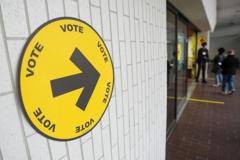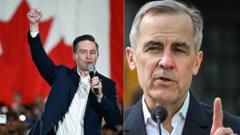In a politically charged election, Canada faces its parliamentary elections today, featuring a contest between the incumbent Liberal Party, led by Prime Minister Mark Carney — a former banker with international clout — and the Conservative Party under Pierre Poilievre, a veteran politician aligning with right-wing principles. Central to the race is President Donald Trump, whose tariffs and threats to annex Canada have heavily influenced voter sentiment.
Canada's Elections: A Battle Over Economy and Identity Amidst Trump’s Influence

Canada's Elections: A Battle Over Economy and Identity Amidst Trump’s Influence
Canadians head to the polls as rampant discussion revolves around the U.S. presidency and its implications for Canada’s future.
Key concerns for Canadians revolve around the economy, closely tied to the impending tariffs, and with many citizens feeling the pinch of weakened economic prospects. Discontent with the current Liberal leadership, which has governed for a decade, has encouraged some voters to shift their allegiance to the Conservatives, who advocate for fiscal restraint, tax reductions, and deregulation.
Conversely, a sizeable segment of the electorate appears to prioritize Canada’s stance against the United States more than economic policy. Many of these voters, increasingly apprehensive about Trump’s approach, lean toward the Liberal Party, trusting Carney’s extensive experience in international economic policy as a stabilizing factor amidst growing tensions.
Conversely, a sizeable segment of the electorate appears to prioritize Canada’s stance against the United States more than economic policy. Many of these voters, increasingly apprehensive about Trump’s approach, lean toward the Liberal Party, trusting Carney’s extensive experience in international economic policy as a stabilizing factor amidst growing tensions.






















